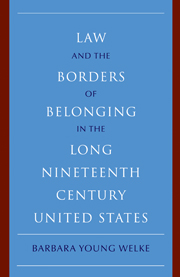Book contents
- Frontmatter
- Contents
- Acknowledgments
- Introduction
- 1 Constructing a Universal Legal Person: Able White Manhood
- 2 Subjects of Law: Disabled Persons, Racialized Others, and Women
- 3 Borders: Resistance, Defense, Structure, and Ideology
- Conclusion: Abled, Racialized, and Gendered Power in the Making of the Twentieth Century American State
- Coda
- Bibliographic Essay
- Alphabetical Bibliography
- Index
Conclusion: Abled, Racialized, and Gendered Power in the Making of the Twentieth Century American State
Published online by Cambridge University Press: 05 June 2012
- Frontmatter
- Contents
- Acknowledgments
- Introduction
- 1 Constructing a Universal Legal Person: Able White Manhood
- 2 Subjects of Law: Disabled Persons, Racialized Others, and Women
- 3 Borders: Resistance, Defense, Structure, and Ideology
- Conclusion: Abled, Racialized, and Gendered Power in the Making of the Twentieth Century American State
- Coda
- Bibliographic Essay
- Alphabetical Bibliography
- Index
Summary
It would be more comfortable if we could relegate abled, racialized, and gendered borders of belonging to history — here the history of America's long nineteenth century. We cannot. The founding assumptions that imagined legal personhood and, from it, citizenship and nation as able, white, and male in America's long nineteenth century fundamentally shaped the development of the American legal and constitutional order for the twentieth century and raise deeper questions regarding the relationship between borders of belonging, the liberal state, and modernity.
The mobilization of law in defense of the able white male republic in the nineteenth century fostered a culture of identity politics that would define the twentieth century. This transformation began with the Reconstruction Amendments to the Constitution in the wake of the Civil War. It is largely to white Southerners’ racial intransigence — embodied in such things as the enactment of Black Codes, the reelection of confederate leaders to Congress and state legislatures, and the savage repression of freedmen — that we owe the Fourteenth and Fifteenth Amendments to the Constitution. Even here, what might have been the real birth of a nation dedicated to the equality of all was hedged from its conception. Section 1 of the Fourteenth Amendment was carefully crafted to exclude from citizenship the vast majority of Native Americans. Fears of the budding women's rights movement led lawmakers to rephrase wording of the Thirteenth Amendment to avoid its application to other relationships of hierarchy, such as between man and wife, and to likewise limit the suffrage provision in Section 2 of the Fourteenth Amendment regarding denial of “male” suffrage.
- Type
- Chapter
- Information
- Publisher: Cambridge University PressPrint publication year: 2010



